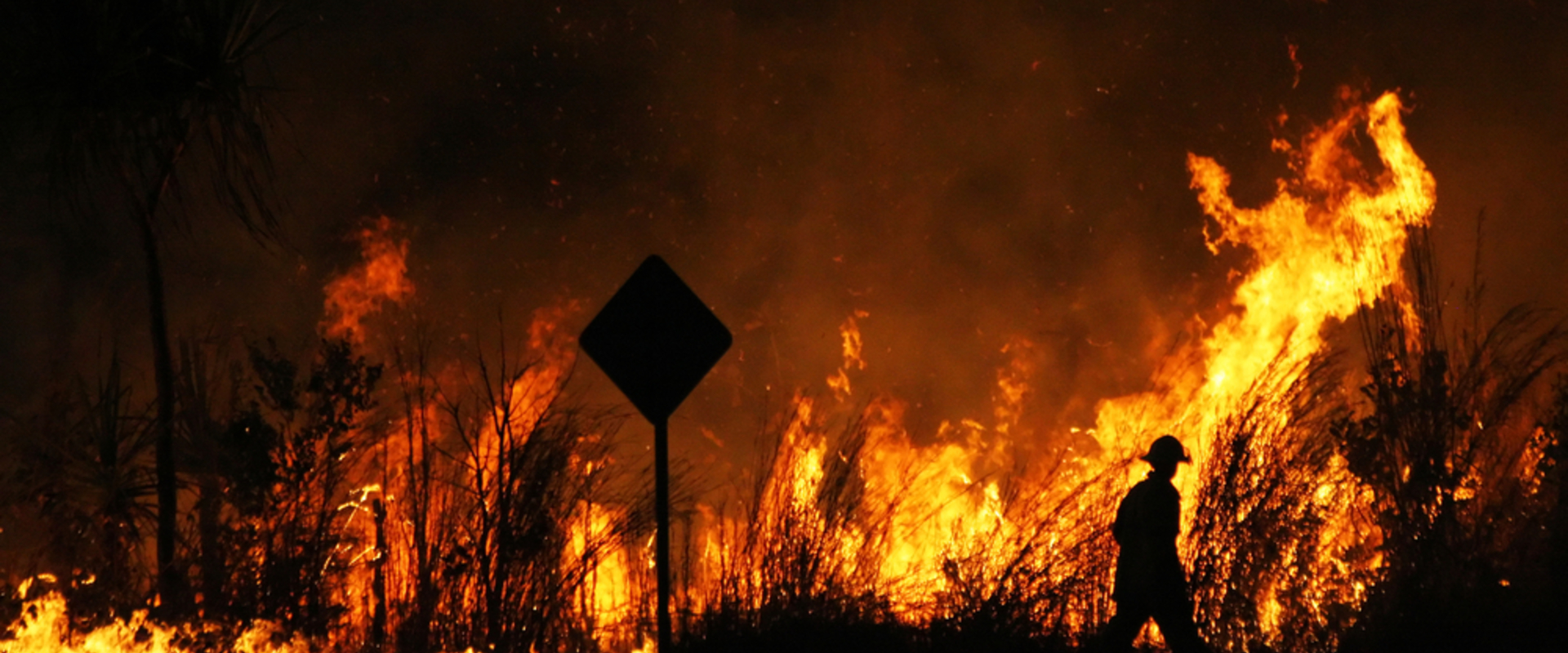climate crisis Australian Unions Respond to Catastrophic Fires

In the past three months Australian workers and communities have faced unprecedented, catastrophic fires. And the fires are still burning.
- Read this in:
- en

Kate Lappin
Australian unions, including PSI’s affiliates, were responding to the foreseeable disaster well before the government started taking the situation seriously. Back in September 2019, the NSW Public Services Association let members know that the state was facing a dangerous fire season and reminded members of entitlements the union-negotiated across the public sector.
The CPSU issued notices to members who were affected by bushfires and about volunteering for an emergency service in December while the government downplayed the disaster and the Prime Minister secretly went on holidays in Hawaii.
Unions warned government of inadequate staff and funding
The Federal Government and NSW State Government were repeatedly warned that under-staffing and inadequate fire-fighting infrastructure could lead to serious disasters. The NSW PSA exposed the under-funding and reduced number of staff in state and national parks, demanding more funding from the state government in November and the firefighters union revealed the government was planning to reduce numbers even further.
Former heads of emergency services had tried to get the attention of the government earlier in the year and begged them to increase funding for public infrastructure to fight fires. Without funding for more public emergency service workers, Australia risks a future where the rich defend properties through private firefighters while the rest lose homes and lives, as happened in the California fires.
Key Figures
In the past three months Australian workers and communities have faced unprecedented, catastrophic fires.
19 mi
acres of land lost
2000
homes lost
1 bi
animals have died
32
people killed
Tens of thousands of workers involved in emergency services
Whether fighting fires, providing health services, repairing damaged infrastructure, providing counselling and relief or playing support roles, paid and unpaid workers are all delivering vital public services and should be recognised as emergency service workers entitled to protections.
In 2018 PSI and unions from all regions negotiated with employers and governments at the International Labour Organisation new guidelines on Decent Work in public emergency services. The guidelines make it clear that emergency services should be predominantly delivered by paid workers. Volunteers, who should only be used for work they are trained for, are also entitled to labour protections, including to high standard personal protective equipment (PPE). These guidelines should be read by all unions in Australia (and in the region), as the climate crisis will force us all to be involved in emergency services, in one way or another.
Australian Federal Government refuses to recognise climate catastrophe
The Australian Government has refused to take serious action to mitigate and adapt to climate change. It took an obstructionist approach at the recent UN climate negotiations and Australia remains one of the highest per capita emitters in the world. It has been ranked as the worst-performing country on climate change policy. The government was repeatedly warned that the climate crisis would exacerbate the frequency and intensity of fires. A group of 22 former emergency service leaders wrote to the federal government early in 2019 seeking increased funding for fire-fighting infrastructure and alerting them to the risk of catastrophic fires.
Eventually, at the request of the Victoria State Government, the federal government agreed to deploy the Australian Defence Forces to evacuate towns and support emergency services workers. It has now announced a Royal Commission into the fires but there are fears this enquiry will be designed to avoid criticisms of federal government and instead shift blame to states.

Unions warned government of inadequate staff and funding and the firefighters union revealed the government was planning to reduce numbers even further.
Unions show solidarity
Since the catastrophe started unions, have been supporting affected members and communities by providing financial support to members who have lost houses, temporarily suspending union dues, advocating for workers who have lost wages or entitlements either because they were volunteering or because workplaces were closed and informing workers about their rights when hazardous smoke and heat conditions make work dangerous.
Unions even teamed up with employers’ associations to demand that the government provide workers who have lost incomes with at least minimum wage, rather than the unliveable social security payment provided to unemployed workers.
The Victorian Trades Hall and the Australian Council of Trade Unions also created a union relief fund and a register of union members prepared to volunteer to help impacted communities both immediately and in rebuilding.
PSI’s Australian affiliates recognise the grave threat that climate change poses and want to see the country develop better climate policies that lead to a just and equitable transition and public investments in renewables and sustainable public services. At PSI’s regional conference in September 2019, Australian unions co-sponsored a resolution on the climate crisis. PSI joined Australian unions to draft a joint statement on the fire catastrophe, demanding immediate action on climate crisis, phasing out of fossil fuels and increasing public investment in renewable energy and public services.
We encourage PSI affiliates to contribute to the Australian Council of Trade Unions Bushfire Relief Fund to support trade unionists whose houses have been lost.